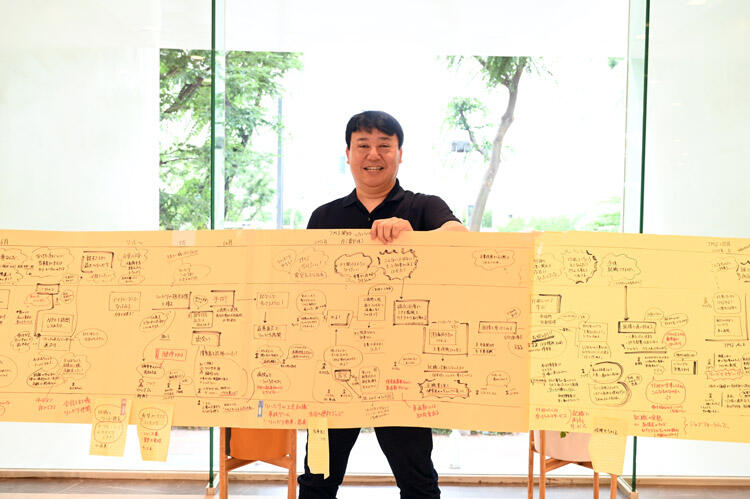
There are more than 9 million people with disabilities in Japan. Society is shifting from the idea that people with disabilities should be protected, to one that aims to include them. IT-based matching services have been started to promote inclusion, and efforts are underway to draw out the potential of people with disabilities. In this article we focus on the goal of realizing a society where everyone can play an active role regardless of their disability from the perspective of awareness unique to people with disabilities, and analyze the degree and nature of disabilities in detail, and by uncovering the hidden abilities that are not being used.
Potential to be active with minimal support
Walking around town, one sees people in wheelchairs or those using a white cane to navigate yellow braille blocks on the street. However, people with disabilities are not only those with physical disabilities. According to a survey by the Ministry of Health, Labour and Welfare, approximately 9.63 million people in Japan live with some kind of disability, including people with intellectual and mental disabilities. That's about 7.6 percent of the total population, or about one in every 13 people.
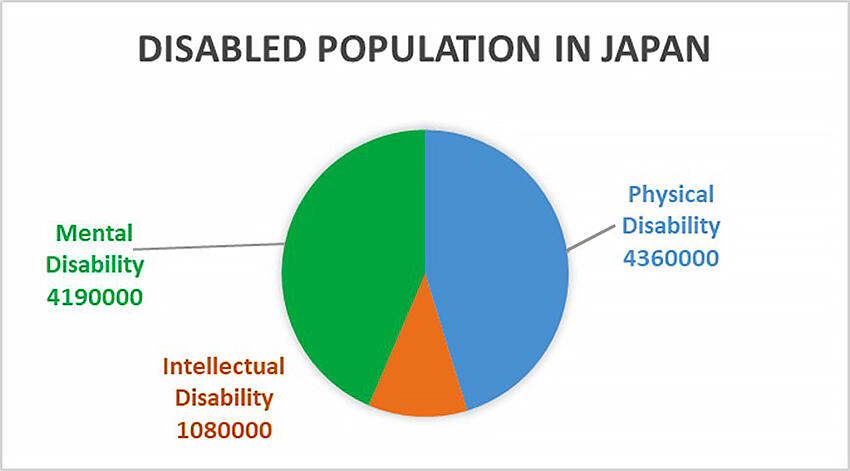
Some of these people are born with disabilities, while others are disabled as a result of accidents or illness. The mentally challenged also include the elderly who suffer from dementia. This makes it clear that there are many different types and degrees of disabilities, and the support needed varies from person to person.
Many of these people are able to play a very active role in society as long as they have some basic support. Yushi Masumoto, president of ActivateLab Co., Ltd. in Shinjuku, Tokyo, is one such person. In 2009, he suffered a cerebral hemorrhage that left him paralyzed on the right side of his body, but he used this experience to start his own business in 2015 and is now developing various businesses with the goal of realizing a society in which people with disabilities can work to their fullest.
Lack of information hindering inclusive employment
However, only a handful of people like Mr. Masumoto are demonstrating their abilities on the front lines of business. Approximately 700,000 people in Japan with disabilities work in the private and public sectors, less than 10% of the total number.
The reason for this, Masumoto explains, is that until just a decade or so ago, people with disabilities were protected and there was little awareness of the need to encourage them to take an active role. In 2008, the United Nations adopted the Convention on the Rights of Persons with Disabilities, which was ratified by Japan the following year. Around the same time, interest in para-sports gradually increased, and awareness of the need to include people with disabilities began to grow in Japan. In the business world, efforts are underway to promote inclusion, with more than 1,000 companies cooperating with a service that uses IT to match people with disabilities with employment support facilities.
In addition, the Act to Facilitate the Employment of Persons with Disabilities obliges employers in the private sector and public organizations to hire persons with disabilities up to or beyond a certain percentage of their full-time employees (statutory employment ratio). However, the private sector, which accounts for the majority of employment, has yet to meet the 2.3 percent statutory employment rate. Although this number has increased compared to 10 years ago, it has not yet reached the level of a broadly active environment.
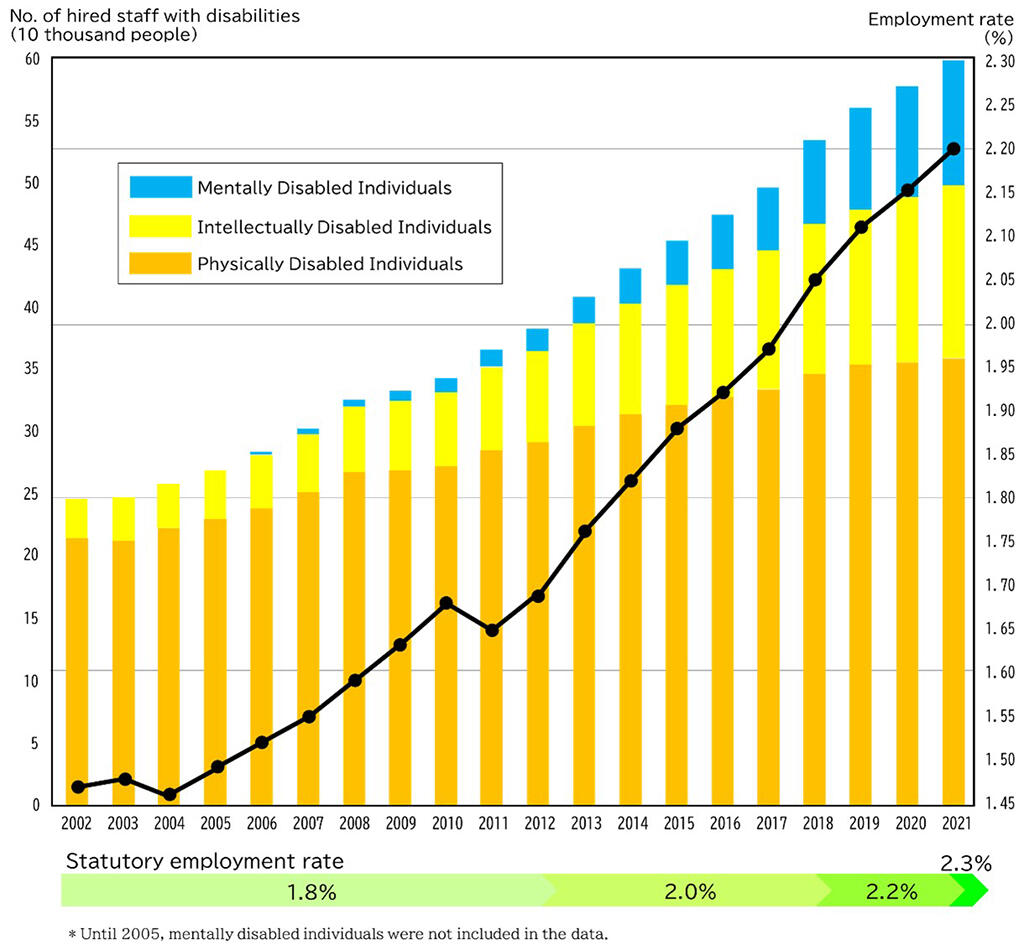
Masumoto points out that that is not the only problem. "I myself looked for a job from when I became disabled, and I gathered a lot of information, but I had a hard time finding what I really needed," he adds. "Every person's disability is different, but when you hear the word 'disability,' it's hard to know which information will be useful to you."
The hard work continued even after finding a job and going through the selection process. "I interviewed with dozens of companies, but all they asked was about my disability, not at all about my abilities or what I could do. It was just a numbers game to meet the statutory employment rate, rather than an expectation that people with disabilities would play an active role," Masumoto explains.
A systematic response once the cause is identified
After experiencing this reality, Masumoto decided to start his own business. Masumoto's idea was that in order for people with disabilities to be able to play an active role in society by making the most of their abilities, they must first be able to receive appropriate information and services.
After being discharged from the hospital, he spent four years in rehabilitation, where he met many people with disabilities and gradually began to analyze them in his own way as he researched various types of disabilities.
Masumoto concluded that disabilities can be explained like chemistry, taking causes and circumstances into account. For example, "Depression is related to a deficiency of a substance called serotonin in the brain. I think it is clearer and easier to understand if we think of disabilities in this way, viewing them like a chemical reaction and considering countermeasures. If we only provide support in the spirit of volunteerism, it ends there and does not lead to the next step. However, once we know the cause, we can come up with systematic measures depending on the disability," explains Masumoto.
Matching engine subdivides the body
Masumoto started to build a new system in order to put this idea into practice. The first thing he developed was "OpenGate," a platform for exchanging and sharing information among people with disabilities. Then, "Bui-kun," a matching engine that subdivides the disability into different parts so that people with the same disability can be identified, was added.
For physically disabled persons, the current Handbook for the Physically Disabled has only two categories of parts: upper body and lower body. As such, Masumoto's paralysis is only on the right side of his body, and even though he can freely use his left hand and left leg, both the upper and lower halves of his body are severely affected. This does not convey accurate information about the disability. Therefore, he divided all body parts into small sections so that each person could communicate about his or her disability by clicking on the illustrations. In this way, people with the same disabilities can share useful information with each other.
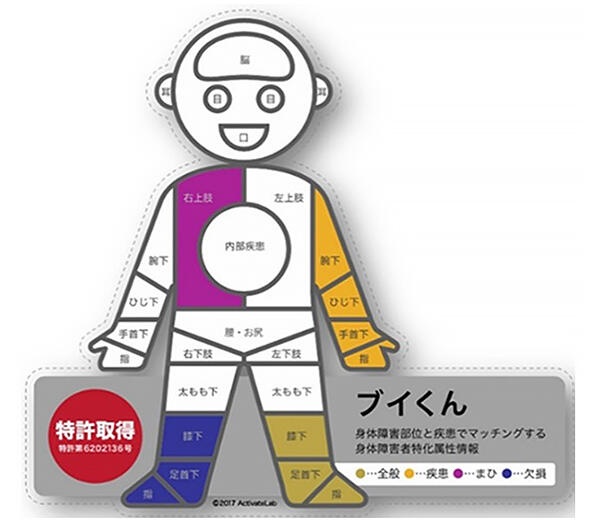
(Provided by ActivateLab).
In addition, Masumoto and his team developed and patented a "translation system for the disabled. This provides detailed information about each person's disability and the necessary accommodations to the company's human resources staff. Companies will be able to identify what they need to take into account by understanding the nature and extent of individual disabilities and will be able to think more concretely about how to respond and the nature of their work, etc., when they cannot not deal with the situation simply by saying they are disabled. In addition, ActivateLab offers consulting services for hiring people with disabilities, and supports recruitment activities by providing advice from the perspective of people with disabilities.
This approach of creating value by analyzing and categorizing the diversity within a cohort without lumping them into a single category is considered effective in the business world. However, the effort to apply this to the field of disabilities and make use of latent abilities in society is novel. This system allows the recruiter to understand disabilities prior to the selection process and to ask about each applicant's skills and strengths during the interview process. It is a way to get away from the kind of interview Masumoto once experienced, in which he was asked only about his disability.
As people with disabilities become more active in society, it will be possible to think of ways to support their mobility and practical work, and new technologies will be developed. Among them, there will be technologies that are beneficial not only for people with disabilities but also for able-bodied people.
Enabling more people with disabilities to play an active role
Masumoto's current fluent speech is hard to imagine given he lost the ability to speak due to the cerebral hemorrhage he suffered. His employees told him he had to speak for himself in order to convey the thoughts and feelings of the disabled, and as a business owner, he worked hard to make his business a success.
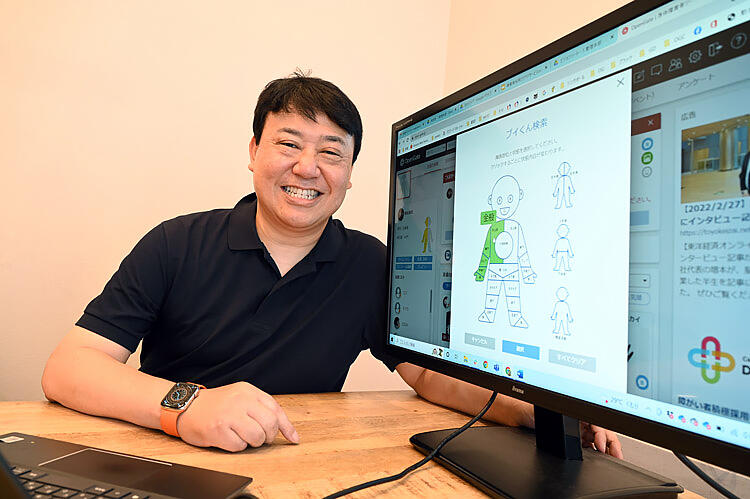
"I don't think most people with disabilities would be placed in such an environment," says Masumoto. However, the enthusiasm of ActivateLab employees and their trust in Masumoto created an environment in which they had to work hard, and Masumoto responded to their efforts. As a result, they were able to talk about their disabilities on their own, leading to the creation of a system that would benefit society. Although the environment varies from person to person and is difficult to generalize, it seems that there are some things that can be done by continuing rehabilitation without giving up.
"Education is the key from now on. I think it is important to teach them how to achieve what they can, to the extent they can," says Masumoto. In addition, Masumoto believes that it is necessary to address the inadequacy of laws that lump different disabilities together.
"We plan to redesign the system and move it to the cloud in the near future, "says Masumoto. Eventually, I would like to bring it not only to Japan but also to the world." A society in which more people with disabilities can play an active role is not only an inclusive society in which they can achieve their independence and well-being, but also a society that brings out their potential and is more vibrant. Masumoto will continue to work hard toward building such a society.
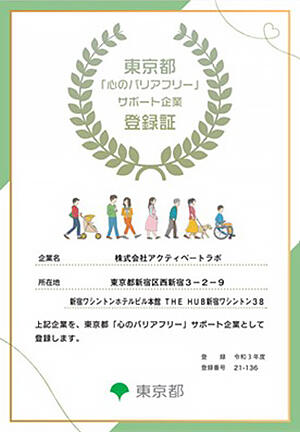
(Provided by ActivateLab).

MASUMOTO Yushi
Representative Director, ActivateLab Co., Ltd.
After working for a major advertising agency, a music distribution company, and an Internet service provider, he suffered a cerebral hemorrhage in 2009 that left him with paralysis of the right side of his body. In 2015, he founded ActivateLab Co., Ltd. to engage in diverse businesses that connect people with disabilities and society.
Original article was provided by the Science Portal and has been translated by Science Japan.




